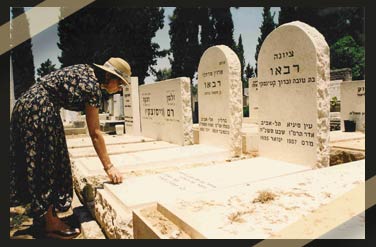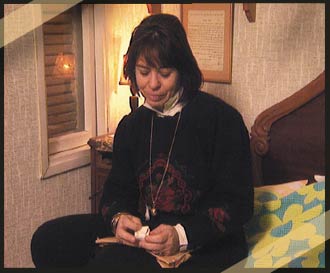|
|
"Daring, Truthful,
Moving & Thought Provoking"
"A Unique Documentary that will touch the hearts of viewers of all ages"

|
|
“Mom died this morning. I always wanted
her to hug me and tell me that I was a good girl, but she never did.”
The film follows Director Yael Katzir through the Shivah of her Mother. The
different stages of grief unfold with the days of the Shivah: loss, pain, reminiscences,
as well as anger, revolt, and ultimately, the search for closure.
The principal characters are Katzir, her Sister Nurit and Brother Micha, her mother’s
sister Zefira, and her children, Dan and Tami.
In the living room people come to console, in the kitchen and bedrooms Katzir and
her siblings intimately discuss painful issues, judging
their Mother.
|
|
But Katzir herself is judged as a Mother by her own children,
and becomes very fragile. The film ends when the mourning clock unwinds a year later.
Katzir discovers a letter her Mother wrote but never sent, in which she finds the
“hug” she always craved. A moving personal diary, the
film documents a Shivah for the first time in real time. The film has its own style:
the man behind the camera (Katzir’s son Dan), becomes a protagonist who motivates
the plot through his penetrating questions. This documentary
compels the viewer to reflect upon his’/hers own formative relations with the parents
as well as the issues of intimacy, intergenerational transmission, warmth and the
ability to express feeling plus the need for a hug.
|
|
|
|
Director's Statement
|
In this intimate portrait, family and old friends gather
in the living room of the filmmaker’s deceased Mother to honor her and celebrate
her life, during the traditional seven days of mourning (the “Shivah” of the title.)
Filmed unobtrusively in real time by Dan Katzir, himself a filmmaker and Yael Katzir’s
son, this documentary skillfully weaves family stories and Israeli history. With
both tenderness and irony, it offers a fascinating view of the two communities brought
together by the parents’ marriage:
Mother, the “wild” Sabra Ziona, native-born Israeli whose very name symbolizes her
deep, activist engagement with the fledgling state, and Father, Erwin Rabau, the
refined, proper “Yekke,” as Hebrew slang referred to German immigrants,
the Doctor from Berlin.
As friends who knew Ziona well reminisce about her life and pay homage to her commitment
in building the young state, they laugh and cry, sing and fall silent, as the family
saga unfolds rhythmically in alternation with national events.
|

|
|
|
But it is in the more private spaces of the parents’ house,
or at more quiet moments after the guests leave each day, that the most revealing
dramas take place. Yael and her sister Nurit, now successful professionals, sit
at the kitchen table struggling to come to terms with their complicated relationship
to their Mother, speaking to the eternal child in all of us. The director’s son
and daughter confront her in a relentless interview in the bedroom. Ziona’s son
Micha, now a physician, reflects wistfully about his Mother’s expectations of her
only boy. In these moments, the film raises the all-too-painful questions bout Mothering,
about how and why we transmit values to our children, about the frailty and shortcomings
of even the deepest love.
Brutally honest and beautifully crafted, this woman’s journey through the process
of mourning and reconciliation moves from a deeply personal story to a universal
one. In so doing, it becomes a work of art. The film’s title, “Shivah” For My Mother,
can be read in two ways. It is both the process of grieving, and the memorializing
of an extraordinary woman’s life. As such, Yael Katzir’s film offers her Mother
the hug she herself craved.
|
|
|
|